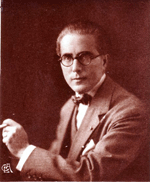9.12.4 Joaquín Nin Castellanos

Joaquín Nin Castellanos, Cuban pianist, composer, musicologist, and educator, was born on September 29, 1879, in Havana. Joaquín was not yet a year old when his parents moved to Barcelona. His musical studies were under the guidance of maestro Carlos Vidiella. In 1895, he performed for the first time before an audience at the Teatro Lírico in the same city.
In 1897, he completed his training and received a degree in piano teaching. In 1901, Joaquín Nin was appointed assistant director of the Catalan Institute of Music; the following year, he returned to Cuba, where he married and traveled to Paris to live there. There, in 1904, he applied for Cuban nationality at the Cuban Consulate. He joined the Schola Cantorum to study Gregorian chant, harmony, and counterpoint, and also took advanced piano classes as a disciple of Moritz Moszkowski.
He also began his musical education and enjoyed a successful career as a concert pianist, giving concerts in numerous countries in Europe and America, a fact that placed him among the world’s most valuable pianists.
In 1905, Joaquín Nin traveled to Havana, where he gave two important concerts at the Salón López, alongside Eladio A. Chao, Benjamín Orbón, and Juan Torroella. Upon his return to Paris, he was chosen in 1906 to serve as a piano professor at the Schola Cantorum.
He established a Concert Society and a music magazine in Cuba after his return to the archipelago in 1910. He founded a pro-arts organization, the Philharmonic Society, and a publication, the Musical Bulletin. At the Havana Philharmonic Society, he held the position of
or as a conductor. In February of that year, he gave his first concert at the Politeama Theater. It featured prominent figures in the musical world, such as the Spanish violinist Juan Manén.
Upon returning to Paris in 1913, he composed his Twenty Spanish Popular Songs, which were premiered in a series of concerts by the great Catalan soprano María Barrientos, accompanied on piano by Joaquín. From then on, his works began to be published by important European publishers and by the most notable Parisian music publisher, Max Esching.
His work as a composer is influenced by Spanish nationalism, and his use of Spanish folklore elements is evident in it. It includes, among other pieces, Cuban dances, piano works, carols, songs, three symphonies, a ballet, and pieces for lute quartet. Known as the champion of Spanish music, his works, such as Twenty Spanish Popular Songs, were considered masterpieces by specialized critics.
Joaquín Nin Castellanos was a member of the Spanish Academy and was awarded the Legion of Honor in France. He researched and disseminated Spanish music and dedicated himself to searching for unpublished piano pieces by Spanish classics of the 17th and 18th centuries. Thanks to this work, Sixteen Early Sonatas by Spanish Composers were published in Paris in 1925. They included works by Antonio Soler, Mateo Albéniz, Cantallos, Blas Serrano, and Mateo Ferrer.
He has given lectures and piano recitals in Spain, France, Germany, England, Belgium, Denmark, Holland, Austria, Hungary, Czechoslovakia, Switzerland, Argentina, Brazil, Uruguay, and Cuba.
In 1929, at the Théâtre des Champs-Élysées in Paris, Antonia Mercé, La Argentina, premiered his Danza Ibérica. In 1939, in Paris, he gave his thousandth concert.
Later, in his homeland, he held various positions, including a professor at the National Conservatory and the Municipal Conservatory of Music; he gave lectures on music aesthetics and history; he was a member of the National Academy of Arts and Letters; he presided over the National Confederation of Directors and Professors of Conservatories and Music Institutes; he wrote articles for various contemporary newspapers and served as editor-in-chief of Musicalia.
In April 1947, a tribute to Joaquín Nin was held at the Auditorium Theater, sponsored by the Society of Friends of Music. Joaquín Nin Castellanos died on October 24, 1949, in Havana.
His compositional credits include the following works: for violin and piano: Spanish Seguida (Old Castile, Murcia, Catalan, Andalusian), In the Garden of Lindaraja, 5 Commentaries. For cello and guitar: Spanish Suite.
Other titles by his authorship: Iberian Dance, Second Iberian Dance, Granadina, Ten Spanish Christmas Carols, Murcian Dance, Andalusian Dance, Iberian Rhapsody, Four Songs of Spain and Lullaby for the Orphans of Spain.
Among the awards and recognitions he collected throughout his career are: Knight of the Legion of Honor, Knight of the Order of Isabella the Catholic, Member of the Academy of Fine Arts of San Fernando, Honorary Professor of the Schola Cantorum of Paris, and of the New University of Brussels, Honorary Diploma of the International Academic Society of History.








